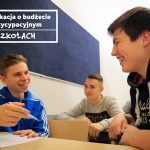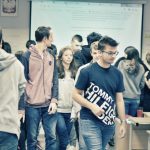
Education about participatory budgeting at schools
Description
The project had two main goals
- to educate young people and teachers about idea of the PB in general, about PB in Warsaw, its rules, outcomes and how the constructing budgeting works
- to increase the participation of young people in Warsaw PB both in terms of applying with their ideas and voting in bp
Preparation
The experience coming from past editions of Warsaw PB shows that with each new year and more educational programs more and more young people take part in PB. Aiming in making their number even higher youth workers engaged in the program prepared one year program that took place in 6 schools (primary schools and high schools) in two districts in Warsaw and were targeted in teachers and students in three stages: firstly groups met youth workers twice to workshop the idea of PB, secondly to consult them in a consulting point, thirdly to present and discuss them in a public debate.
Number of hours with students: 100 classes with workshops (50 groups twice), 50h of consulting, two public debates
Number of meetings with the teachers: 6 workshops for 40 people
Number of people engaged: 5 educators/youth workers
Implementation
Promoting: 80 posters, 1500 informative leaflets
During the program we worked with:
- District councils, who took part in preparing educational materials and creating lesson scenarios and later consulted students’ ideas;
- Schools and teachers, who met with youth workers to increase their knowledge about the idea of bp, its rules, the ways to create a correct, doable application to support their pupils;
- Pupils, who participated in classes and workshops with youth workers that aimed at informing about the role of bp in realising district goals, possible topics of applications according to the district’s needs and specificity.
The project timeline:
- Meeting with school community
- Workshops with teachers about the rules and the implementation of district PB
- Introductory class about district PB with students
- Creative workshop about students’ ideas for the PB projects lead by youth workers
- Consulting points with youth workers and municipality workers
- School debate
- Promotion of the admitted projects
Ways of engaging young people
After the group workshops with teachers and pupils’, youth workers organised the consulting point for the interested pupils who wanted to ask questions, clarify the rules of PB and talk about their project ideas in smaller groups. Students were encouraged to propose their own ideas and prepare their own project application. Draft applications were presented in the public school debate in the presence of other students, teachers, school staff and invited public administrative workers who were professionally connected to the bp. The debates were an opportunity to discuss pupils’ draft projects, which helped them to improve them, but also to engage all pupils in the decision making process and promotion.
During the workshops and consulting point meetings youth workers facilitated the process of writing the PB project application by the students which resulted in 10 new projects that were created and admitted to the Warsaw District PB. Each of them was created as a pupils’ unique idea that was corresponding to the the district needs. Out of 10 project ideas admitted 2 won the voting and were fulfilled in the upcoming months.
First, “Free thematic night film screening” with the cost of 63 000 PLN that took place in the primary school which the proposer of the idea attends. Overall 9 summer screenings were organised weekly in July and August 2019. The author's idea was realised by the public institution that deals with public film screening and city culture.
Second, “Be available - eco benches” with the cost of 78 000 PLN which proposed the idea of benches that work also as the free electronic stations that enabled charging electronic devices using solar batteries. In June 2019 4 of this type of benches were introduced in the district, also next to the high school that the project proposers attend. The idea was fulfilled by the district institution that deals with public space.
The District Hall was fully founding the whole educational process and the PB projects implemented within it.
Role of young people
- Participants
- Beneficiaries
Positive aspects of the project/process
- linking the theoretical knowledge with practical action
- political education that shows that working in public administration is about caring for the common good and does not have to be about parties and big political topics
- giving the agency to young people by creating opportunities not only to voice their opinion but do real change in the neighbourhood
Main obstacles to the project/process
- working around the school calendar of free days or end of semester exams and grading made it difficult to set deadlines and include all
- highly feminized group of students (achieving gender balance in the educational project is difficult)
- students complained that people were hesitant to share their personal data needed to support their project in the pb voting because of their age
- the most difficult step for students was to set a realistic and correct budget of the project, which made them discouraged and gave them the feeling of being incompetent
- the District Hall was fully founding the whole educational process and the PB projects implemented within it, which means the schools were not taught in practice about the ways of collecting founds
Opinion after implementation
The project reached its goal in increasing the knowledge about the PB processes among young people and the increase in knowledge about how to educate about PB processes among teachers.
In quantitative terms:
- 70% of students and teachers who took part in the project increased their knowledge about the PB processes;
- over 90% of teachers who took part in the seminars claimed they increased their knowledge about how to educate about the PB processes;
-
Students increased their desire to take an active part in the District and City PB in multiple levels: helping others to apply with their idea (6% growth), signing support for projects (25% growth), promoting the idea of voting among others (10% growth), voting in the next round of Warsaw PB (17% growth).
In qualitative evaluation, students showed that the process showed them the potential of the PB especially in terms of:
-
increasing the feeling of community in the city;
-
influencing the positive change in the city;
-
the possibility to decide about the district.
1-3 tips (advices, warnings) from organizers or participants
“admitting your project for voting and them participating in its fulfillment when it wins is the most effective way of civic education”
“this experience shows that young people can be partners in a dialogue about important common problems with administrative public workers and try to solve them together”
“when working with young people during the whole school year it's important to keep it fun and maintain excitement while responding to their needs: for example, some pupils were stressed about calling public workers with questions on the phone, so we helped to practice it with them by mock phone calls”
Links to examples of application forms, voting styles, tools
Publication from the first edition of the project (in Polish): https://poledialogu.org.pl/wp-content/uploads/2016/07/Mlodziez-i-bp-otwieranie-drzwi.pdf
List of materials to use in classes (in Polish):
https://poledialogu.org.pl/mlodziez-i-budzet-partycypacyjny-otwieranie-drzwi-do-demokracji/



